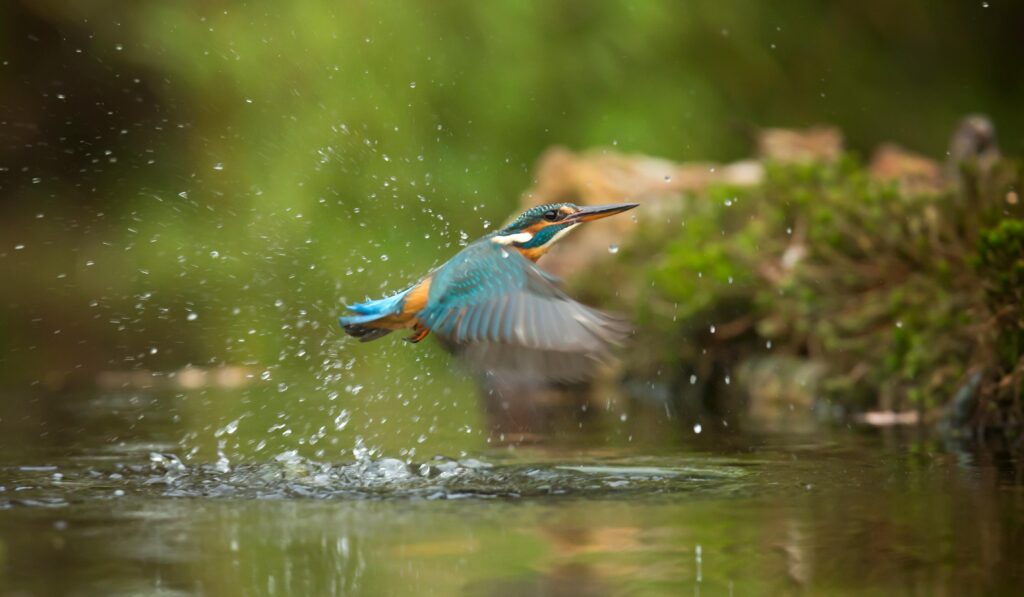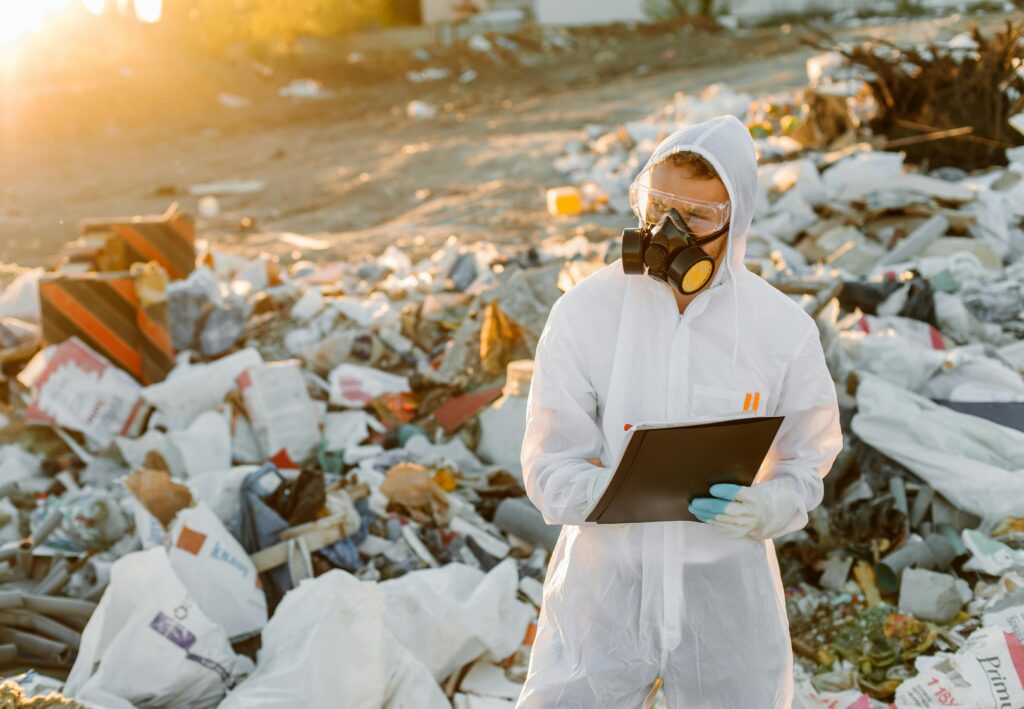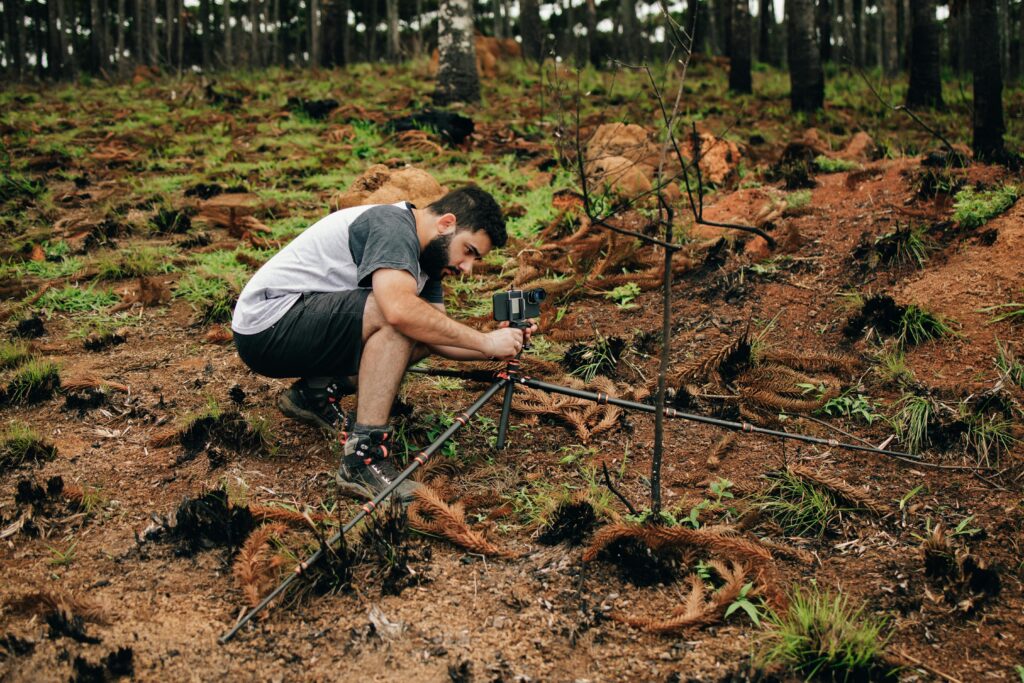
Environmental Science Careers
Environmental science careers are some of the fastest growing and most meaningful career fields in the world today. Many in-demand environmental science jobs combine cutting edge research with helping to preserve our planet for future generations. Environmental science careers can be found in a wide variety of industries including tech, healthcare, politics, and academia. Because of the variety of career fields available and the value of environmental science degrees in the job market, the importance of environmental science cannot be overstated.
Graduates of environmental studies colleges gain access to many different job opportunities after earning their environmental science degree. The answers to the question, “What can you do with an environmental studies degree?” are as diverse as the people who pursue that pathway in college. Environmental science careers span a variety of industries across the private sector and include environmental science government jobs in fields like lobbying, urban planning, and more.
In this article, we will discuss the importance of environmental science and answer questions about environmental science careers, such as:
- What can you do with an environmental studies degree?
- What is a typical environmental scientist salary?
- What classes do you need to take at environmental science colleges to prepare yourself for environmental studies jobs?
- What impact can you make with an environmental science degree?
- What are some popular career fields for people with an environmental science degree?
- What is the starting environmental scientist salary and how much can you earn over the course of your career?
To start, let’s break down the field of environmental science in more detail.
What are the 5 major fields of environmental science?
There is significant diversity when it comes to environmental science careers. However, there are a few fields and industries that stand out in the job market. Unlike chemistry or physics, environmental science is a multifaceted scientific discipline. Data analysis, environmental impact of human populations, and the effects of climate change are just a few examples of the many environmental science topics you could explore in this field. Because of the range of courses that environmental studies majors take, they are well prepared to enter many different career fields after earning their degree.
Within the study of environmental science, there are five main fields:
- Atmospheric sciences
- Ecology
- Environmental chemistry
- Geosciences
- Social sciences
These five environmental science topics make up the core of the curriculum at most environmental sciences colleges. As such, getting a sense of each is a great way to understand what to expect from your environmental science degree program. Let’s take a minute to explore each of these environmental science topics in more detail.
Atmospheric sciences
This topic covers climatology, weather predicting, and pattern analysis. With the rapidly changing climate, being able to analyze complex weather patterns to predict the location of severe storms is becoming a more important branch of science than ever. Because the atmosphere is made up of different chemicals and energy transfer happens constantly, atmospheric scientists must use both chemistry and physics to inform their study of both weather and climate.
Ecology
This is the study of how organisms within an environment interact with each other. Many environmental studies jobs, from urban planning to wildlife conservation, use ecology to understand the impact of organisms on their environment. These applications reveal the importance of environmental science in balancing human activity with the protection of ecosystems.
Environmental chemistry
Environmental chemists study biochemical reactions and processes, particularly associated with humans and their interactions with the environment. This includes pollution, chemical development, waste management and much more. Because of the broad scope of environmental chemistry, there are many different environmental studies jobs available in this field.
Geosciences
This field deals with the composition of the earth and how to manage earth’s resources effectively. This is extremely important when it comes to energy use, pollution, and conservation of natural resources. Although the name suggests primarily land-based research, geoscientists also study the oceans and atmosphere in an attempt to understand the shifting landscape of our planet.
Social sciences
Finally, this human-focused subfield combines environmental science with anthropology and sociology to study humans and their interactions with the environment. Social scientists deal with public policy, sustainability issues, and how to affect change on a behavioral level for the benefit of the environment as a whole.
Earning your Environmental Science Degree

The first step toward landing any of these environmental science careers is getting your environmental science degree. Degrees may be offered as a B.A. or a B.S., so you’ll need to decide which type of degree aligns with the environmental studies jobs you’re interested in. Additionally, you might encounter both “environmental science” and “environmental studies” programs. Some environmental science colleges may also have more niche or specific degree programs.
Types of environmental science degrees
For instance, the University of Kentucky offers three different degrees related to environmental science/studies:
- Earth and Environmental Sciences
- Environmental and Sustainability Studies
- Natural Resources and Environmental Science
On the other hand, SUNY College of Environmental Science and Forestry offers both broad and specialized degrees, including:
- Environmental Science
- Environmental Studies
- Environmental Biology
- Environmental Education and Interpretation
- Environmental Health
- Environmental and Natural Resources Conversation
Though there’s certainly variation, you’ll generally see the same core science courses featured in any environmental studies curriculum. Because environmental studies jobs are so interdisciplinary, most programs expose students to a wide range of scientific disciplines. Expect to take courses in biology, chemistry, physics, statistics, and geography, as these environmental science topics form the cornerstone of the major.
Some students choose to specialize in a particular branch of environmental science. Others may choose to double major in order to broaden their horizons. When exploring schools, look for colleges with environmental science majors that align with your interests and career goals. Then, when it’s time to apply, explain the importance of environmental science to you and how a particular program will help you reach your goals.
Once you have been accepted, focus on the specific environmental science topics you are most passionate about. Review the course listings for your college or university and try to find research opportunities or internships through your department. These opportunities not only show you what can you do with an environmental studies degree but also provide stepping stones to environmental studies jobs later on.
What can you do with a degree in environmental science?
The question of what can you do with an environmental studies degree is one of the most important to consider. Common environmental science careers include researchers, data analysts, conservators, and more. However, the roles for environmental science jobs go way beyond the traditional science paths. From environmental science government jobs to jobs in academia, law, or consulting, environmental science careers can be found in almost every industry.
Public sector work in environmental science includes policy making, lobbying, and resource conservation. At local, state, and federal levels, government employees work to understand how public policy can help the environment and how to effectively manage public resources. Private sector environmental science careers tend to be in scientific fields, but also at colleges, corporations, or healthcare settings. These environmental studies jobs involve lots of private consulting, corporate sustainability management, and environmental research.
Some environmental studies jobs require a more advanced environmental studies degree. While most environmental science careers only require a bachelor’s degree, some need a master’s or even a doctoral degree. Epidemiologists, for example, tend to need master’s degrees, while environmental lawyers require a doctorate in law in order to practice. Check the Bureau of Labor Statistics’ Occupational Outlook Handbook to see what environmental science degree you need to go into your preferred careers (and find the average environmental scientist salary).
Career Outlook and Opportunities in Environmental Science

Because of the importance of environmental science to so many industries, the demand for environmental science careers has skyrocketed. Issues such as climate change, severe weather patterns, deforestation, and water scarcity have become much more prevalent. Environmental studies jobs are on the front line trying to combat these serious problems. Because of this, environmental science careers are in high demand, and students graduating with an advanced degree can earn a very competitive environmental scientist salary.
The Bureau of Labor Statistics predicts environmental studies jobs will grow at a rate of about 4% over the next several years. As countries around the globe are committing to improve sustainability efforts, many of these roles are environmental science government jobs dictating global energy policy and conservation efforts. Across the country, online job boards and career search websites list a variety of environmental science careers, including conservation and resource management jobs.
Beyond environmental studies jobs themselves, green skills are also in high demand as more and more jobs are looking to incorporate sustainability into their workplaces. This term “green skills” applies to the technical knowledge and problem solving abilities required to address important environmental science topics across a range of different fields. Green entrepreneurship, for example, helps small business owners and startup founders consider the environmental impact, both positive and negative, their companies can have. These environmental studies jobs make a massive impact on both local communities and the environment as a whole!
16 Environmental Science Careers to Consider
There are plenty of different environmental science careers to explore — here’s a good place to start. Below we’ve listed some of the top environmental science careers along with some information about each one, including the average annual environmental scientist salary (as reported by ZipRecruiter).
16 Environmental Science Careers

1. Environmental scientist: $84,123
These professionals conduct research on different aspects of the environment, such as wildlife, pollution, water quality, and more! They study phenomena like climate change, air quality patterns, and chemical composition, both for governments and for private companies and organizations.
2. Environmental consultant: $56,151
These environmental studies jobs are typically with a large consulting firm that help clients with sustainability efforts. They work with companies, small businesses, and governments to improve their environmental efforts and advance green initiatives.


3. Environmental manager: $112,353
An environmental manager oversees compliance with environmental regulations and sustainability laws. They educate other employees within an organization about how to promote sustainable practices and follow rules surrounding sustainability.
4. Natural resource manager: $93,206
Natural resources managers monitor ecosystems to ensure that resources like water, minerals, plants, and animal life are being monitored appropriately. Out of all the environmental science careers on this list, these have the most hands-on impact, interacting with plants and animals and ensuring that humans have as limited impact on these as possible.


5. Environmental compliance specialist: $66,814
These environmental science careers are all about making sure private companies are complying with local sustainability codes and laws. They handle building site inspections, code violation reports, and data collection. They also partner with regulatory agencies to ensure proper enforcement of environmental regulations.
6. Sustainability specialist: $122,624
A sustainability specialist, like an environmental compliance specialist, works with private companies to ensure that they are incorporating sustainability into their projects and building designs. They help clients set green goals and put practices in place to reach those goals.


7. Environmental policy analyst: $72,221
These analysts work to educate the public on the effects of different environmental policies. They also create policy recommendations for local governments and gather data to support the creation of new environmental regulations.
8. Climate change analyst: $97,659
They study the causes and effects of climate change and develop strategies to deal with its effects. They may work for government agencies or private companies.


9. Environmental chemist: $63,466
They test levels of various chemicals in the environment and monitor for potentially harmful chemicals. Environmental chemists also issue warnings to the public about contaminants in the air, water, and land and collect samples to analyze for patterns.
10. Hazardous waste management specialist: $68,204
These specialists handle the transport and disposal of dangerous chemicals and other hazardous materials that might pose a threat to humans or the environment. They must be familiar with EPA regulations as well as local and state laws regarding hazardous materials and their handling.


11. Air quality specialist: $95,064
As their name suggests, air quality specialists monitor the health of the air and atmosphere and track levels of pollution in different areas. They run lab tests on air samples and help companies that are polluting to find solutions to reduce the harmful effects of manufacturing on the air quality.
12. Water quality scientist: $71,807
These scientists test water to ensure its safety and quality. They monitor ecosystems for potential contaminants and issue advisories about the safety of various water sources in their area.


13. Conservation scientist: $88,966
These professionals work to preserve wildlife and plant life from damage and overconsumption. They manage natural resources to ensure that they are being used appropriately and sustainably.
14. Environmental laboratory technician: $59,435
These scientists work in testing and collection labs handling samples collected by other environmentalists in the field. They run lab tests on these samples and report findings to other scientists for further analysis. They typically require less coursework and some can enter this field with an associate’s degree.


15. GIS specialist: $70,280
GIS stands for Geographic Information Systems and refers to a specialty of environmental science that uses software to map landscapes and cities for disciplines like urban planning. They work with programs and often require experience with computer science in addition to environmental science.
16. Environmental health & safety specialist: $65,884
These workers oversee workplaces to ensure the maintenance of safety standards and health codes. If an accident occurs that is related to the environment of the workplace, they handle the follow up and help companies keep compliance with regulations surrounding health and safety.

Next, let’s explore another great job — one with a high environmental scientist salary — that we didn’t cover on our list.
What does an environmental engineer do?
Environmental engineers work on projects and design systems to promote environmental sustainability and waste reduction across a variety of industries. Their projects include water treatment plants, chemical processing facilities, and sustainable infrastructure projects — basically anything related to preserving the planet. Environmental engineers often have experience in construction, project management, and resource allocation, as well as a broad understanding of different environmental science topics.
Their work is extremely hands-on compared to environmental science government jobs or other environmental science careers. As such, environmental engineers have a high annual salary at $91,191/year.
It is important to remember that environmental engineering is often a separate degree from environmental science. Because it incorporates courses from civil, mechanical, and chemical engineering, the major track is often very different from a traditional environmental science major. If you are looking to pursue a career in environmental engineering, you should look into a specialized degree from a school like SUNY College of Environmental Science and Forestry to best prepare you for the kind of work you will be doing!
Other Uses for an Environmental Science Degree
Students can put their degree to good use in a variety of environmental studies jobs outside the traditional STEM pathways. While these careers may not always provide as high of an environmental scientist salary, they are extremely fulfilling and can help students pursue their passion for sustainability and a second field of study.
For instance, students with a passion for healthcare might consult for a group of hospitals about how to reduce medical waste at their facilities. Students with a passion for teaching might become a faculty member at a college or university or pursue other environmental studies jobs in academic settings. When it comes to environmental science careers, the possibilities are virtually limitless!
Entrepreneurial students might use their environmental science degree to start their own green business or support a startup in the sustainability sector. Another growing industry? Tech! There are plenty of environmental science careers in tech fields helping to develop sustainable technology. And, with the rise of generative AI platforms, the environmental impact of the tech industry is under more scrutiny than ever, putting the demand for sustainable solutions to this new energy crisis at an all time high.
Environmental studies jobs with non profit organizations and charities looking to shape environmental policy are on the rise too! Trends such as environmental racism, which explores the intersection of racial and environmental issues, are leading to new jobs in data analysis and policymaking. Because these jobs are in high demand, the potential to earn a high environmental scientist salary is very good!
Considering Environmental Science Government Jobs

As you consider different environmental science careers, you’ll find a number of environmental studies jobs at various levels of government. These types of government jobs typically involve enforcing environmental regulations, conducting environmental research, managing natural resources, and analyzing environmental policy. Environmental science government jobs can require many different skillsets, including data analysis, public speaking, and writing skills.
Environmental science government jobs can be found at a number of different agencies at both the federal and state levels. The Environmental Protection Agency, the United States Geological Survey, and the National Oceanic and Atmospheric Association are all agencies that employ environmental science graduates and professionals.
These jobs cover all kinds of environmental science topics, from monitoring air quality to soil testing. They come with strong benefits, too, and provide opportunities to participate in meaningful projects and create large-scale social impact. However, job fulfillment, and even job security, isn’t always guaranteed. Drawbacks of environmental science government jobs include high competition for job placements and, more recently, uncertainty around job stability and funding.
Do environmental scientists make good money?
If you’re interested in environmental studies, it’s important to familiarize yourself with average incomes, as well as the factors that impact an environmental scientist salary. Environmental science careers come in many forms, and how much money you make will depend on the environmental science topics you’re most interested in, who you work for, and the type of work you hope to do.
According to the U.S Bureau of Labor Statistics, the average environmental scientist salary is $80,060 per year. Generally, the starting environmental scientist salary is between $30,000 – $50,000, with longer-term earnings averaging over $100,000.
An environmental scientist salary depends greatly on seniority level, the kind of environmental science degree someone has, and the industry they work in. As previously mentioned, environmental studies jobs exist in both the private and public sectors, and across various specializations and locations. Each of these factors can impact the kind of environmental science careers available, as well as their salaries.
If you’re aiming for higher pay, there are a couple of different ways to secure a higher environmental scientist salary. You can pursue a more advanced environmental science degree, such as a PhD program. Additionally, you can get a higher environmental science salary by obtaining professional certifications, or by moving into consulting roles. You can also tailor your search to environmental science careers in specialized industries that are in high-demand. With critical environmental changes requiring urgent solutions, demand for environmental studies jobs is expected to rise in renewable energy, government and public policy, and corporate sustainability.
Given the importance of environmental science, environmental science careers often provide stability and competitive salaries for long-term professionals. Exploring different types of environmental studies jobs and their salaries can be helpful information as you map out your career.
What is the highest paying job in environmental science?
The environmental science careers that pay the highest are typically found in upper-level management roles. These high paying environmental studies jobs are usually gained over years of experience. For instance, roles like Environmental Engineering Manager, Chief Sustainability Officer, and Natural Science Manager can easily earn over $100,000. These environmental studies jobs average between $150,000 – $200,000 per year.
Upper-level environmental science careers are typically focused on managing large scale projects, leading teams, or designing corporate sustainability efforts. These environmental science careers are typically found at larger corporations, governmental agencies, and consulting firms. However, these jobs are often hard to get right out of college, and people typically spend years building up to these titles. So, while there’s certainly significant earning potential in environmental science, keep in mind that it’ll take some time before you see these higher salaries.
High paying environmental science jobs are also found within very specific industries, such as astronomy or geothermal engineering. If you’re interested in specific environmental science topics, you can find a list of average salaries per topic here. Additionally, as environmental science becomes more important, brand new opportunities may be created in new industries. Learning the trends and where the field is developing can be a smart way to identify higher paying roles in the future.
Is environmental scientist a good career?

As you explore environmental science careers, you might wonder if it’s a good career path for you. Many factors decide if a career is a good fit or not. Given the importance of environmental science and its impact, a driving factor for many environmental scientists is finding deep meaning in their work.
Solving large scale environmental challenges, helping companies become more sustainable, and engaging in meaningful research are all parts of many different environmental studies jobs. Many environmental science careers provide the opportunity to help enact change, at both the small and large scale. From testing soil and water samples to ensure public safety to developing warning systems for natural disasters, environmental scientists do important work. With such a range of important jobs, the best career fit will greatly depend on your personal preferences.
Work-life balance, salary, and working conditions
Depending on the environmental science topics you’re interested in, you’ll find a wide range of jobs with varying degrees of work-life balance. Given the nature of environmental studies jobs, someone may need to respond to natural disasters and would need to be readily available at a moment’s notice. However, other roles may provide much more flexibility, such as academia or private consulting practices. With an environmental science degree, you can explore jobs across both the public and private sectors to find roles that suit your personality and interests.
As we’ve discussed in previous sections, your environmental scientist salary will also greatly depend on the role you choose. Opportunities for advancement will also vary; some industries allow environmental scientists to move into management roles, while others will lead to specialized technical roles. Think about what your long-term career goals are — do you see yourself in a leadership role, or working behind the scenes? That can help you pick the best career path and steer you toward the right type of environmental studies jobs.
It’s important to recognize the challenges of environmental science careers as well. Competition for grants and research funding can be difficult. The fieldwork associated with environmental studies jobs can be tiring, and sometimes dangerous. Collecting field samples from various environments can lead to long hours outside, or in remote parts of the world. Political and regulatory pressures can also be difficult to navigate. However, the importance of environmental science often encourages people to push past these challenges.
If you’re asking the question, “What can you do with an environmental studies degree?”, you can rest assured that many people find long and meaningful careers within environmental science. Despite the challenges, environmental studies jobs provide unique opportunities to enact change and explore the complexities of this multidisciplinary field.
How do I get a job in environmental science?
If you’ve been intrigued by environmental science careers, you can take action steps to help secure a job that allows you to build on your interests and passions. It’s helpful to know which environmental science topics you’re interested in, so you can tailor your job search and education. With the rising importance of environmental science, many new jobs will likely be created over the next few years. This section will detail what steps you can take to secure any number of environmental studies jobs you may be interested in.
Choose the right program
To qualify for environmental studies jobs, you’ll need to hold an environmental science degree. You can explore larger research universities, smaller liberal arts colleges, and even specific environmental science colleges, like the SUNY College of Environmental Science and Forestry. At the SUNY College of Environmental Science and Forestry, students have a wide range of environmental science topics to explore, from Land Surveying Technology to Wildlife Science. Regardless of where you study environmental science, be sure to take advantage of all the environmental science resources available at your school.
Build connections and gain experience
While getting your environmental science degree, plan to network and participate in internship programs. Talk with industry professionals about their environmental science careers and see what advice they have on your job search. Volunteer and participate in research projects at your school, and try to explore many different environmental studies topics to narrow your focus. Seek mentorship with environmental scientists and attend industry conferences to build your network.
Keep an eye out for different non-profits or companies that speak to you. If you’re able to volunteer with them, that can be a great way to get your foot in the door and gain some experience. You can also keep track of what job openings they have to get a sense of what your career could look like. For example, The Nature Conservatory has regular job openings, as well as the UN Environmental Programme. Keeping track of organizations that reflect your passions is a good way to set yourself up for a long career.
Know what training you need
In addition to your environmental science degree, try to obtain technical certificates that can help improve your employability. Gaining skills using GIS technology, environmental sampling, or data analysis can help qualify you for a wide range of environmental science careers. Becoming well-versed in regulatory knowledge and various policies can also help give you a leg-up in the job search.
If you’re wondering, “What can you do with an environmental studies degree?”, know that many environmental science careers require specific training, and may even require advanced degrees. However, it’s important to build up work experience before pursuing an advanced environmental science degree. Many environmental studies jobs are more accessible to those with tangible work experience, unless you’re interested in academia or research.
In short, securing a job in environmental studies requires specific training and knowledge. Knowing which environmental science topics interest you can help guide your educational path, and ensure you network with the right professionals. Become familiar with the ins and outs of the industry and complete internships and volunteer opportunities, and you’ll start earning an environmental scientist salary in no time!
Where to look for top environmental science jobs?

As you research environmental studies jobs, it can be helpful to research current job openings to get a sense of what’s available. To find environmental studies jobs, you can look at general online job boards and different company career pages. For environmental science government jobs, focus your search on government job portals. You can also explore job boards dedicated to environmental science careers, such as Conservation Job Board and the Earth Science Women’s Network.
In addition to job boards, environmental science colleges also often host various jobs and networking opportunities. Take advantage of your schools’ career fairs, recruitment events, and alumni networks. They’ll help you secure internships during school and maybe even your first job after graduation.
Additionally, keep an eye out for emerging environmental science topics and jobs that are created around new climate technologies. Renewable energy, sustainability consulting, and the environmental impacts of AI are all opportunities to build dynamic and rewarding environmental science careers.
5 Tips for Planning Your Environmental Science Career
As you explore environmental science careers, you may wonder what action steps you can take to help secure a great job. We’ve outlined the top 5 tips for planning a great environmental science career so you can get a head start.
5 Environmental Science Career Planning Tips

1. Set both short-term and long-term career goals
Knowing what kind of environmental studies jobs you’re interested in is only the first step. Most careers span decades, so it’s a good idea to think both short- and long-term. What kind of environmental scientist salary do you hope to make? Will you need an advanced degree at some point? What topics interest you? Knowing your long-term goals can help put your short-term goals into perspective, and ensure that you’re making the right steps along the way.
2. Know your personal priorities
Are you concerned about work-life balance? Or do you want to make as much money as possible? Are you interested in solving a particular problem, or researching a specific idea? Knowing your personal priorities when it comes to environmental science careers can help guide your decision making. Think about what kind of work environment you’d like — would you enjoy working out in the field, in a lab, or in a corporate setting? With such a wide range of environmental studies jobs, there’s something for everyone.
3. Get a wide variety of experience
Work experience is essential as you enter the job market, and it’s important to diversify your resume. Try to build out a range of experiences, including internships, different research projects, and volunteer work. With so many different environmental science topics to explore, it’s important to experiment with different subfields to see which inspires you. Gaining a wide range of work experiences will also help you narrow down your career goals.
4. Build a professional network
Most environmental science careers are built over time, and through professional networks. Reach out to professors conducting research that interests you, or ask to get virtual coffee with industry professionals. Speaking with other environmental scientists can help you learn which roles are best for you and where the industry is heading. See if your school offers a mentorship program, and keep in touch with everyone you meet through volunteering, internships, or at conferences. The earlier you start building a professional network, the better!
5. Continue your education
Remember, the answer to “What can you do with an environmental studies degree?” depends on your level of education. Many environmental studies jobs require advanced degrees or additional schooling. From certificate programs and learning new technologies to earning new credentials, be sure to plan out your continued education options. With the rising importance of environmental science, it’s a given that the industry will change and grow over time. Try to be one step ahead of the curve — think about how you’ll continue your education long after you graduate.
Environmental Science Careers- Final Takeaways
So, what can you do with an environmental studies degree? The short answer: a lot! Environmental science offers a wide range of jobs and careers that help blend the sciences with politics, public health, and a passion for nature.
Environmental science careers can look vastly different from one another, from field and lab work to corporate sustainability policy. With environmental studies jobs found across both the public and private sectors, earning an environmental science degree opens the door to a rich and vibrant career field.
If you’re interested in studying environmental science, but aren’t sure where to begin, CollegeAdvisor is here to help! Our personalized, one-on-one college advising program will help you navigate each part of the college application process. From building your college list, writing your essays, to making your final decision — CollegeAdvisor is here for you, every step of the way.

This article was written by Alex Baggott-Rowe and Jessica Klein. Looking for more admissions support? Click here to schedule a free meeting with one of our Admissions Specialists. During your meeting, our team will discuss your profile and help you find targeted ways to increase your admissions odds at top schools. We’ll also answer any questions and discuss how CollegeAdvisor.com can support you in the college application process.
